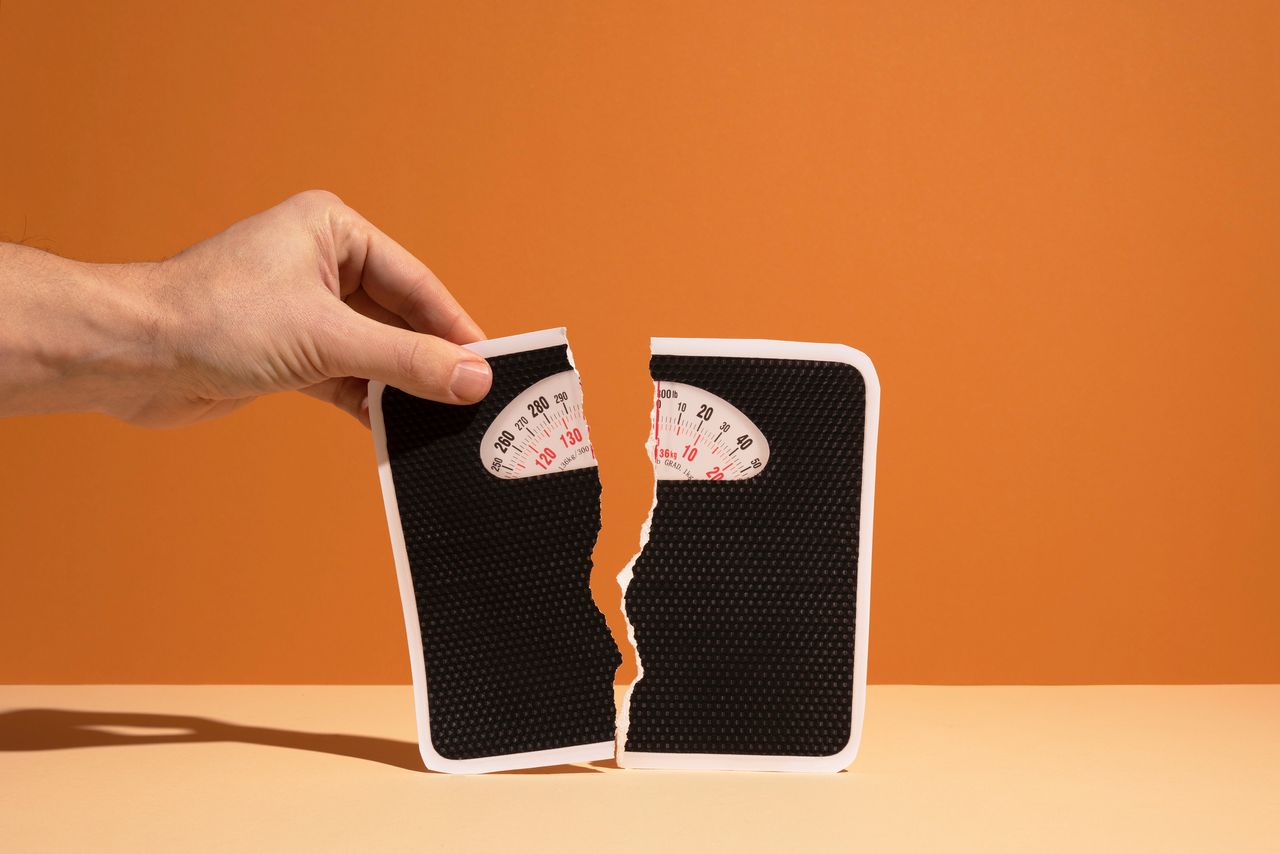When ‘Drop It’ Is the Best New Year’s Resolution
Some aspects of sleep, weight, friendships and fitness aren’t worth worrying about
Millions of people spend the final days of December coming up with ambitious tasks for the new year. In 2023, resolve to take something off your plate instead.
Physical and mental health—including eating habits, self-care, exercise and weight loss—are among the most common focuses for resolutions. But nearly two-thirds of people who set New Year’s resolutions abandon them within the first month, according to research published in the International Journal of Environmental Research and Public Health.
Part of the problem is that designating vague goals often sets us up for failure, physical- and mental-health professionals say. Consciously removing some of them from your mental to-do list can help alleviate stress and improve focus, says social psychologist Jessica Ayers.
“By taking off one of those big, lofty goals, you’re giving yourself the freedom to actually pursue the goals that are most important to you,” says Dr. Ayers, who is based in Boise, Idaho.
Here are four anti resolutions that will help you enter 2023.
Stop Worrying About Being Night Owl
If you are one of the many people whose bedtimes shifted later during the pandemic, you might be resolving to go to bed earlier. Getting more sleep is a worthy goal, but being a night owl isn’t necessarily the problem, according to sleep researchers.
People have individual chronotypes, or natural tendencies for waking early or sleeping in. When it comes to sleep health, quality, quantity and consistency are the most important metrics, sleep experts say.
If you go to bed at midnight but get between seven and nine hours of good-quality sleep, there is probably no need to worry about moving your bedtime up, says Shelby Harris, a Westchester, N.Y.-based clinical psychologist specialising in behavioural sleep medicine.
Dr. Harris says she has noticed a stigma around being a night owl, compared with morning larks, who are often viewed as more productive and in sync with the nine-to-five schedule. She tells patients they should only embark on the often difficult work of shifting their circadian rhythms, which she says can cause anxiety and insomnia in the early stages, if they are suffering from sleep deprivation.
Stop Weighing Yourself
Many people resolve to lose weight in the new year only to end up obsessing over the number on the scale or give up altogether, doctors and dietitians say.
For those whose doctors have urged them to monitor their weight at home, including people working to prevent or manage chronic conditions, patients undergoing cancer treatments and certain people who are underweight, it is a good idea to keep the scale handy, according to health experts.
Otherwise, consider ditching the scale altogether, says Gregory Dodell, an endocrinologist in New York City who sees many patients for weight-related matters. Self-weighing has been associated with weight loss, but also lower levels of self-esteem and higher levels of stress, according to a meta-analysis of 23 studies published in the journal Health Psychology Review in 2016.
“Stepping on a scale without any other health markers is not very impactful,” says Dr. Dodell.
He recommends giving priority to healthy behaviours, such as incorporating more movement into your day and eating enough protein, fruits and vegetables, which can improve health indicators even if they don’t affect weight. Patients who like tracking health metrics might want to focus on other quantifiable characteristics such as blood pressure and blood-sugar levels, he says.
Caroline Susie, a registered dietitian in Dallas, says she has focused on celebrating what she calls non-scale victories with clients, which can include sleeping better, having regular bowel movements, or feeling more energetic.
Stop Worrying That You Don’t Have Enough Friends
Many resolution-setters aim to meet new people and make new friends, but when it comes to friendships, psychologists say, quality matters more than quantity.
We have a limited amount of time and energy to invest in our relationships, says Dr. Ayers, the social psychologist. Keeping a smaller circle of friends allows us to invest more time into meaningful conversations with them, she says.
“Think of deepening instead of broadening,” says psychologist Marisa G. Franco.
As we age and become aware that the end of our lives is drawing closer, we tend to care less about having more friends, a phenomenon known in the field of social science as socio-emotional selectivity. To start forging closer bonds, increase the amount of time you spend with your close friends. That can mean scheduled dates, such as weekly dinners or book clubs, but should also include last-minute hangouts, says Dr. Franco.
“It’s a sign of intimacy when we believe people won’t reject us,” she says.
In a 2020 study of women published in Adultspan Journal, those who visited with close friends a couple of times a week felt younger and had significantly higher levels of life satisfaction than those who visited with theirs a couple of times a year or not at all.
Stop Wasting Money on Fitness
Planning to join a pricey health club or fitness program this year? Don’t rely on the price tag to motivate you.
“Meaningful, lasting, positive change doesn’t come from shame, blame and guilt,” says Darlene Marshall, a personal trainer and wellness coach in Valley Falls, N.Y.
Before you hit “subscribe” on a membership you might not make the most of, ask yourself what you are hoping to get out of it. For many, the answer goes beyond losing weight or looking good in their jeans, says Ms. Marshall. Getting outside, even for short periods, can provide mental and physical health benefits.
“If the question is, ‘Which is going to help with my well-being: the walk in the park or 20 minutes on the StairMaster?’ The walk in the park is going to have a better outcome,” she says.
About 20 minutes of daily moderate-intensity aerobic physical activity, which could include a brisk walk or pushing a lawn mower, provides the same health benefits as running for 60 to 75 minutes a week, according to guidelines from the Centers for Disease Control and Prevention and the American College of Sports Medicine.
Outdoor activities, such as group walks, hiking or biking, became more popular during the pandemic, according to the ACSM’s 2023 fitness trends report.
“Outdoor activity doesn’t take any technology and they don’t have to rely on an instructor instructing them from who knows where,” says Dr. Walt Thompson, former president of the ACSM and author of the report.
 Copyright 2020, Dow Jones & Company, Inc. All Rights Reserved Worldwide. LEARN MORE
Copyright 2020, Dow Jones & Company, Inc. All Rights Reserved Worldwide. LEARN MORE
This stylish family home combines a classic palette and finishes with a flexible floorplan
Just 55 minutes from Sydney, make this your creative getaway located in the majestic Hawkesbury region.
As Paris makes its final preparations for the Olympic games, its residents are busy with their own—packing their suitcases, confirming their reservations, and getting out of town.
Worried about the hordes of crowds and overall chaos the Olympics could bring, Parisians are fleeing the city in droves and inundating resort cities around the country. Hotels and holiday rentals in some of France’s most popular vacation destinations—from the French Riviera in the south to the beaches of Normandy in the north—say they are expecting massive crowds this year in advance of the Olympics. The games will run from July 26-Aug. 1.
“It’s already a major holiday season for us, and beyond that, we have the Olympics,” says Stéphane Personeni, general manager of the Lily of the Valley hotel in Saint Tropez. “People began booking early this year.”
Personeni’s hotel typically has no issues filling its rooms each summer—by May of each year, the luxury hotel typically finds itself completely booked out for the months of July and August. But this year, the 53-room hotel began filling up for summer reservations in February.
“We told our regular guests that everything—hotels, apartments, villas—are going to be hard to find this summer,” Personeni says. His neighbours around Saint Tropez say they’re similarly booked up.
As of March, the online marketplace Gens de Confiance (“Trusted People”), saw a 50% increase in reservations from Parisians seeking vacation rentals outside the capital during the Olympics.
Already, August is a popular vacation time for the French. With a minimum of five weeks of vacation mandated by law, many decide to take the entire month off, renting out villas in beachside destinations for longer periods.
But beyond the typical August travel, the Olympics are having a real impact, says Bertille Marchal, a spokesperson for Gens de Confiance.
“We’ve seen nearly three times more reservations for the dates of the Olympics than the following two weeks,” Marchal says. “The increase is definitely linked to the Olympic Games.”

Getty Images
According to the site, the most sought-out vacation destinations are Morbihan and Loire-Atlantique, a seaside region in the northwest; le Var, a coastal area within the southeast of France along the Côte d’Azur; and the island of Corsica in the Mediterranean.
Meanwhile, the Olympics haven’t necessarily been a boon to foreign tourism in the country. Many tourists who might have otherwise come to France are avoiding it this year in favour of other European capitals. In Paris, demand for stays at high-end hotels has collapsed, with bookings down 50% in July compared to last year, according to UMIH Prestige, which represents hotels charging at least €800 ($865) a night for rooms.
Earlier this year, high-end restaurants and concierges said the Olympics might even be an opportunity to score a hard-get-seat at the city’s fine dining.
In the Occitanie region in southwest France, the overall number of reservations this summer hasn’t changed much from last year, says Vincent Gare, president of the regional tourism committee there.
“But looking further at the numbers, we do see an increase in the clientele coming from the Paris region,” Gare told Le Figaro, noting that the increase in reservations has fallen directly on the dates of the Olympic games.
Michel Barré, a retiree living in Paris’s Le Marais neighbourhood, is one of those opting for the beach rather than the opening ceremony. In January, he booked a stay in Normandy for two weeks.
“Even though it’s a major European capital, Paris is still a small city—it’s a massive effort to host all of these events,” Barré says. “The Olympics are going to be a mess.”
More than anything, he just wants some calm after an event-filled summer in Paris, which just before the Olympics experienced the drama of a snap election called by Macron.
“It’s been a hectic summer here,” he says.

AFP via Getty Images
Parisians—Barré included—feel that the city, by over-catering to its tourists, is driving out many residents.
Parts of the Seine—usually one of the most popular summertime hangout spots —have been closed off for weeks as the city installs bleachers and Olympics signage. In certain neighbourhoods, residents will need to scan a QR code with police to access their own apartments. And from the Olympics to Sept. 8, Paris is nearly doubling the price of transit tickets from €2.15 to €4 per ride.
The city’s clear willingness to capitalise on its tourists has motivated some residents to do the same. In March, the number of active Airbnb listings in Paris reached an all-time high as hosts rushed to list their apartments. Listings grew 40% from the same time last year, according to the company.
With their regular clients taking off, Parisian restaurants and merchants are complaining that business is down.
“Are there any Parisians left in Paris?” Alaine Fontaine, president of the restaurant industry association, told the radio station Franceinfo on Sunday. “For the last three weeks, there haven’t been any here.”
Still, for all the talk of those leaving, there are plenty who have decided to stick around.
Jay Swanson, an American expat and YouTuber, can’t imagine leaving during the Olympics—he secured his tickets to see ping pong and volleyball last year. He’s also less concerned about the crowds and road closures than others, having just put together a series of videos explaining how to navigate Paris during the games.
“It’s been 100 years since the Games came to Paris; when else will we get a chance to host the world like this?” Swanson says. “So many Parisians are leaving and tourism is down, so not only will it be quiet but the only people left will be here for a party.”
This stylish family home combines a classic palette and finishes with a flexible floorplan
Just 55 minutes from Sydney, make this your creative getaway located in the majestic Hawkesbury region.






















